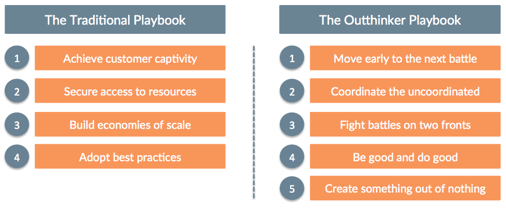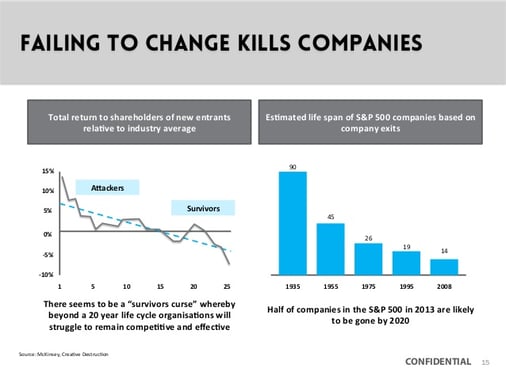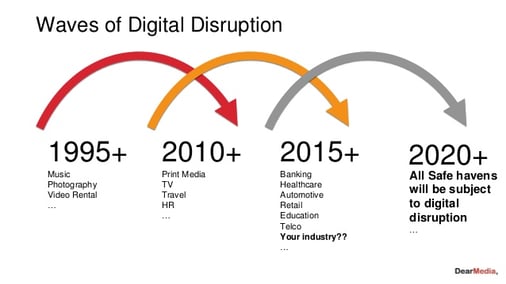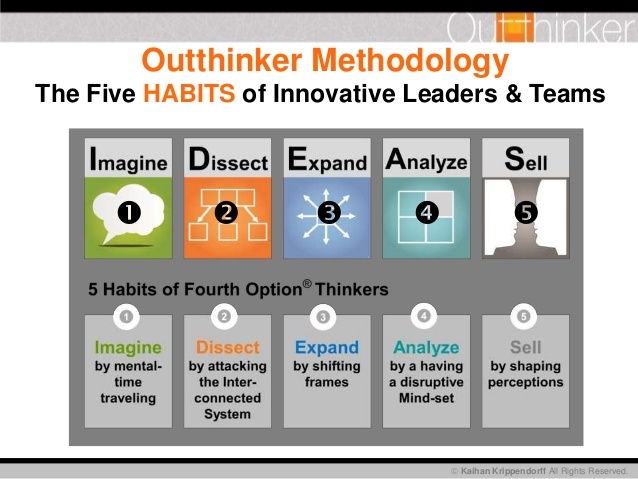How do some people see and seize strategic options that others overlook?
 If you’ve been following our blogs on Outthinker Strategies, you might be asking this question.
If you’ve been following our blogs on Outthinker Strategies, you might be asking this question.
Our past several blogs share the 5 most commonly used strategies by Outthinkers to disrupt their competition to achieve success, according to Outthink the Competition: How a New Generation of Strategists Sees Options Others Ignore by Kaihan Krippendorff:
- Move Early to the Next Battleground
- Coordinate the Uncoordinated
- Force a Two Front Battle
- Be Good
- Create Something Out of Nothing
Failing to Change Kills Companies
 Before sharing the five habits of Outthinkers, it’s critical you and your business understand the need for your business to change. The following two graphics should get your attention. Your business, how you conduct it, what and how your competition does business, how your customers respond and act is changing. Drastically! More to the point: Disruptively! It’s not a question of whether it will or not. It’s simply a matter of time. If you fail to change, your business will become the most recent fatality to the disruption occurring in today’s economy.
Before sharing the five habits of Outthinkers, it’s critical you and your business understand the need for your business to change. The following two graphics should get your attention. Your business, how you conduct it, what and how your competition does business, how your customers respond and act is changing. Drastically! More to the point: Disruptively! It’s not a question of whether it will or not. It’s simply a matter of time. If you fail to change, your business will become the most recent fatality to the disruption occurring in today’s economy.
Digital Disruption, as this graphic shares, is coming to your business.
The Five Habits of Outthinkers
Let’s look at habits Outthinkers share.
Positioning Systems Strategic Discipline is the fundamental practice of creating Winning Habits. Krippendorff’s identifies these Outthinker characteristics as habits. Outthinking is another habit you can cultivate, learn and develop to help your business.
Krippendorff mashes all of his experiences, teaching, studying today’s and past great thinkers, contrasting these thought processes of Outthinkers with the rest of us, to identify five key habits leading Outthinkers see and realize to produce unorthodox solutions. I’ve shorten the definitions in the book. Krippendorff invests a chapter in each habit. I urge you to get the book and read it to capture the critical nature of these ideas and habits:
- Mental time travel: Outthinkers travel mentally toward a future. They imagine a future across multiple planes. They imagine what they want, what the environment will look like, and what competitors and other players will be doing. They paint in all of the details of that future image. They write it down on paper, or they hold the image firmly in their minds. With this vivid future completely defined, they are able to focus their efforts on what must be changed to convert the current state of things into the desired future.
Every great achievement was a vision before it became a reality. ~Henry Kissinger
To help you think similarly Krippendorff shares the three planes you need to consider, which Chinese military strategist Sun Tzu advised generals to consider when planning for battle:
- You: Sun Tzu called this man. It represents what you, your team, or your organization wishes to accomplish. This is your mission and vision.
- The environment: Sun Tzu called this heaven or the sky. It represents all that is outside of the control of the people in your game, the atmosphere in which you must achieve the vision you set above. It includes things like interest rates, jobless rates, capital flows, and gross domestic product (GDP) growth.
- Other players: Sun Tzu called this ground. It represents, in our application, everything that is in control of the other players in your game. It encompasses the potential actions of your competitors, suppliers, distributors, regulators, and so forth.
The ability to travel mentally forward in time is a key distinguisher between humans and animals. We all begin developing this ability around the age of three. Some of us continue developing this for many years, and a few of us become quite advanced. Outthinkers, I believe, have a heightened ability. As a result, they advance where others hold back, they see things as possible that others cannot fathom, and they are able to see “reasons something won't work” as simply “issues that remain to be resolved.”
- Attack of the interconnected system : The lesson is this: If you attack the obvious parts of the system, the only way to do better than your competition is to execute better. This is riskier and more tiring. If, instead, you step back and look at the entire system, paying attention to the invisible interconnections, you may find a way to win faster and with greater ease. Outthinkers think in terms of a system, whereas their competitors focus on just the obvious nodes in the system. This lets Outthinkers identify points of leverage others overlook. Regardless of how far you feel comfortable taking this—from building a simple map, to defining your key priorities this week, all the way to embracing the Taoist view that everything is connected—it is worth taking a pause before you begin problem solving. Study the overall system. Figure out what depends on what, then build out the web until you see clearly the fronts of your battle and the levers you must apply pressure to in order to realize your vision.
- Frame-shifting : During the Korean War, the U.S. Air Force asked their best fighter pilot, John Boyd, to analyze how he trained pilots to outmaneuver even better-armed enemies. Boyd took the task seriously. He analyzed not just his dogfights, but many of history's greatest battles, to understand what great generals did to win. After years of analysis and refinement, he came up with a powerfully simple answer. It underscores the power of being able to shift your perspective more often and more quickly than your competitors'.
His theory: all intelligent organizations, and even organisms, win by passing more efficiently through four stages of interactions with their environments:
-
.jpg?width=133&name=John%20Boyd%20The%20Mind%20of%20War(Outthink%20Competition).jpg) Observation: Collecting data from multiple sources (e.g., the senses for organisms, business systems for corporations, spies for the CIA).
Observation: Collecting data from multiple sources (e.g., the senses for organisms, business systems for corporations, spies for the CIA).- Orientation: Analyzing and synthesizing the data to form a mental model.
- Decision: Deciding to take a specific set of actions based on your mental model.
- Action: Physically making or executing your decisions.
I never came upon any of my discoveries through the process of rational thinking. ~ Albert Einstein
Great strategists—Outthinkers—shift frames. They attack the problem with a greater number and diversity of viewpoints. This creates two advantages: First, they see more options than others see, which makes them more likely to find the silver bullet. Second, the resulting strategy, if it is rooted in a different frame, will be more disruptive because competitors will be slow to respond. They will resist shifting their frame, giving the Outthinkers a head start.
- Disruptive mind-set: Krippendorff shares the following tactics essential for building a disruptive mindset in your business:
- Innovate Faster
- Slow Down the Competition
- Doing What Your Competition Will Not Do
- Doing What Your Competition Cannot Do
- Block the Competition
If everything eventually becomes a toaster, the job of the Outthinker is twofold. First, you must figure out how to slow down that process as much as possible. This means convincing the competition to hold off copying you, even if they can. The longer you can hold them off, the longer you have to be earning a higher profit margin. Second, you must always be moving so nimbly that your competitors can't copy you, even if they want to.
- Perception shaping; The art of moving people's wills involves more skill than determination. You must know how to get inside the other person. . . . Everyone idolizes something. Some want to be well thought of, others idolize profit, and most people idolize pleasure. The trick is to identify the idols that can set people in motion.
—Balthasar Gracian, The Art of Worldly Wisdom
The final habit that Outthinkers exhibit is shaping perceptions. We often think the job ends when we have come up with the brilliant idea. What is left is to simply execute it. But before you even have something to execute, you must enroll key stakeholders—funders, employees, partners, and so on. This requires shifting their perspectives so that they see the attractiveness of your idea. The key difference between how Outthinkers take on this challenge and how less skilled influencers operate is that Outthinkers get into the minds of those they are seeking to influence. They shift their language—their metaphors, narratives, and frames—and pick precisely the right words. They understand that reality is relative, that very little of the reality we operate in is rooted in hard, tangible fact. They shape others' perceptions and in doing so shape their realities and change the world.
2018 & Outthinker Planning
Get a head start on your 2018 planning by attending Scaling Up Business Growth Workshop in Cedar Rapids, IA. We’ll be sharing these ideas on Disruption and Outthink the Competition, plus our Scaling Up and Strategic Discipline principles.
If you’re looking for innovative ways to develop your business, contact dwick@positioningsystems.com. Or take our Four Decisions Needs Assessment and we’ll contact you.
KEEPING POOR PERFORMERS – NEXT BLOG
Last week a friend asked me to get together. Despite consistently scoring high on his performance matrix, he recently had his future freed up. He asked me for insight on how to approach his next position, and what to do about his advancing age, since he was sure his potential employer would ask him. What he shared with me in our meeting, revealed the mistake businesses make when releasing good performers and keeping poor ones.






.jpeg?width=150&height=135&name=Hand%20with%20marker%20writing%20the%20question%20Whats%20Next_%20(1).jpeg)

